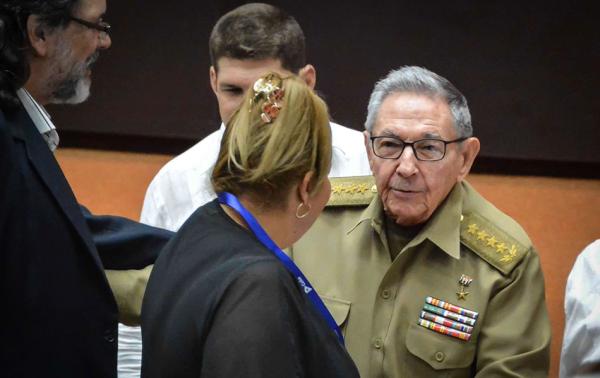A draft of an updated constitution for Cuba approved by the island’s National Assembly on 22 July has made headlines as much for what was left out as what was put in. Here are highlights of what’s in, what’s out and what’s staying in the proposed new Cuban constitution.
Why the plans for a new constitution?
The proposed 224-article new constitution will replace the 1976 national charter that enshrined one-party communism on the island following Fidel Castro’s 1959 revolution.
Acknowledging that Cuba and the world had changed since 1976, newly-elected Cuban President Miguel Díaz-Canel said the new realities meant the constitution was “obliged” to be updated, and he called the reform “deep”.
Mr Díaz-Canel, who took over from Fidel Castro’s brother Raúl on 19 April – the first time for decades Cuba’s head of state has not carried the name Castro – said the new document would reflect “the now and the future of the nation”.
Proposed changes that recognise same-sex marriage, but drop a previously stated objective of constructing a “communist society” in Cuba, have drawn intense media attention. However, the Caribbean nation definitely will be keeping its one-party socialist political and economic system, ruled over by the Communist Party of Cuba.
While it has already been approved “unanimously” by the 600-plus assembly deputies, Cuban officials said the document would be subjected to a process of “popular consultation” among the island’s people, to gather comments and suggestions, before being submitted for final approval in a national referendum.
In: Marriage ‘between two persons’
One alteration that attracted comment both inside and outside the island was the proposal to redefine the institution of marriage as being between “two persons” rather than “a man and a woman” – a change effectively opening the way for the legalisation of same-sex marriages.
This was undoubtedly a novelty in a country where the communist authorities – in the name of “revolutionary morality” – had persecuted homosexuals as “scum” in the first few decades following the 1959 revolution, often dispatching them to work camps along with priests and other “anti-social” elements.
Since the collapse of the Soviet bloc after 1989 which pushed Cuba to open up more to the outside world, official attitudes to both religion and homosexuality have eased.
In the 21-22 July debate by the National Assembly on the revised constitution, Cuban media made a point of highlighting the support for the marriage re-definition expressed by “deputy Mariela Castro” – the 55-year-old daughter of Cuban Communist Party leader and former president Raúl Castro.
Mariela Castro, who is the director of the Cuban National Centre for Sex Education (CENESEX), has gained prominence as a defender of LGBT rights.
In: Role of the market
While reaffirming the overriding principles of a “socialist” economy and central economic planning, the proposed new charter gives formal juridical recognition to the “the role of the market”, and “private property” as one of a range of types of property existing in the Cuban economy.
The “market” and “private ownership” are both key elements of Western capitalism which were long pilloried as corrupting generators of inequality by Cuba’s Communist Party rulers.
So the changes reflect the realities of Cuba’s own experience, which saw the island forced to open itself up more to foreign tourism and investment after the disappearance of its Soviet benefactor, including allowing of private self-employed economic activities and enterprises for which more than half a million Cubans currently have licences.
Observers saw the constitutional tweaks moving Cuba in the direction of – but still far from close to – the types of “market socialism” currently practised by political allies like China and Vietnam.
However, unlike those countries, Cuban officials and state media were still expressing public aversion to the idea of excessive individual enrichment, and the revised constitution continues to prohibit private “concentration of property”.
In: Prime minister and governors
The constitutional reform introduces proposed novelties in the organisation and hierarchy of the Cuban state.
One is the creation of the post of prime minister, to lead the Council of Ministers (cabinet) in the day-to-day running of the country. This prime minister would be designated by the National Assembly at the proposal of the president.
This reinstates a position that had existed in the early years of the Cuban revolution.
Another change is a proposal to have governors ruling Cuba’s 15 provinces – instead of the current presidents of provincial assemblies – but the new constitutional text also stresses the importance of “municipal autonomy”.
Out: Aiming for a ‘communist society’
The elimination of the phrase “to advance towards communist society” has generated the most attention and comment. The revised article retains the goal of “the construction of socialism”.
Some media jumped on this change. “Cuba renounces communism,” was the excited headline carried by Cuban dissident website CiberCuba on 21 July.
Even inside Cuba, the proposed alteration has produced debate, for example, on the curated readers’ comments section of the official Communist Youth daily Juventud Rebelde on 22 July.
Reader “Juan R Oro” wrote: “The majority of us Cubans are not in agreement with this project of a constitution nor with the fact that the word communism is eliminated from this.”
Another reader, “El Oriental” (The Easterner) had a different view: “Jose del Oro, if communism has been a failure in Europe and what it does is keep investors away, why keep insisting on an obsolete and demonstrably failed system which does not evolve, it simply disappears.”
Staying: Communist Party of Cuba and single-party system
Cuban leaders and official media made very clear however the island was not giving up its one-party socialist system, or the pre-dominance of the ruling Communist Party, specifically defined as “Fidelist” and “Marxist-Leninist”.
Communist Party daily Granma declared on 23 July: “The [constitution] project reaffirms the socialist character of our political, economic and socialist system, as well as the directing role of the Communist Party of Cuba.”
In comments carried on state TV, Cuban National Assembly President Esteban Lazo assured viewers that “the ideology” was not being “lost” but updated to aim for “sovereign, independent, democratic, prosperous and sustainable socialism”.
Many Cuban exiles and anti-government dissidents were unimpressed by the proposed constitutional changes.
In an apparently mocking reference to the continuation of the one-party state, Cuban dissident website 14yMedio carried a 22 July commentary headlined: “There will be no transition in Cuba… not even to communism”.
Some exile commentators were asking whether the alterations meant Cuba’s schoolchildren, who start each day with a salute and the words “Pioneers for communism! We will be like Che [Guevara]!” would be changing their slogan now.
据俄罗斯卫星通讯社23日援引古巴共产党中央委员会新闻网站Granma消息称,新宪法草案获得了代表们的投票一致同意通过。
《纽约时报》称,新的宪法在生效之前还需要在接下来的一系列会议中进行讨论,并经过全民公投。
宪法草案限制国家元首的任期为十年(每届任期5年,可连任1次),并新设立了总理一职。草案中称,古巴国家活动的主要原则之一是建设社会主义。
宪法草案第一次提出禁止性别歧视。此外,另据《哈瓦那时报》22日报道,新的宪法有望在古巴允许同性婚姻。据报道,草案第68条定义婚姻为“两人之间自愿的结合”,并未限定为“一男一女”的结合,这被认为是给同性婚姻合法化打开大门。
据《纽约时报》报道,宪法草案还承认私有财产的权利。
此前,据海外网15日报道,古巴目前的宪法仅承认国家、合作社、农民、个人与合资企业的财产。不过,前任古巴领导人劳尔·卡斯特罗自2010年开始,为了促进经济发展及古巴社会主义可持续发展,进行了经济改革,他让数十万古巴人加入到自营经商的队伍中,这些私营企业涉及餐厅和美容院等领域。
海外网援引古巴《格拉玛报》于当地时间15日公布的新宪法摘要称,其中包含的草案总共为224篇,比先前多出137篇。不过,该报当时称,古巴新宪法将承认自由市场制度和私有财产。这可能意味着,尽管宪法重申国有企业仍然是整体经济的支柱,但那些刚刚起步的企业家和外国投资者也将受到法律的保护。
如果通过,新宪法将取代现行的1976年通过的宪法。

